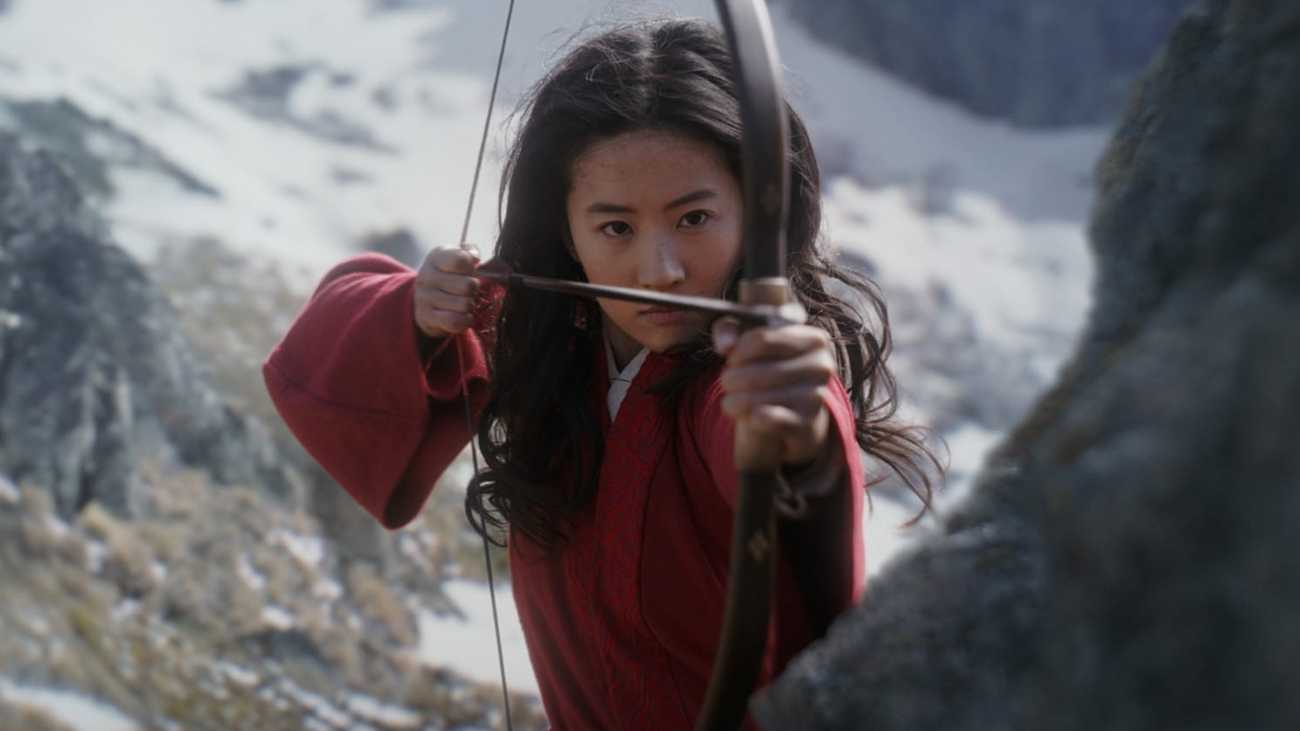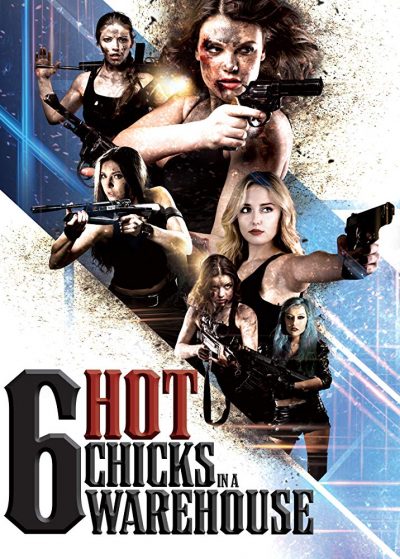 ★★★
★★★
“The most expensive straight-to-video release ever.”
Okay, that’s perhaps a little unfair. When this began filming, back in August 2018, who could have predicted that the summer this year would be all but wiped out [seriously: the second quarter in North America, the total box-office was $4.8 million. Last year, the same period brought in $3.3 billion] As films scrambled to re-establish themselves, finding new slots for hopeful release, post-pandemic, there were inevitable casualties, as some were left without seats when the music stopped. Probably the biggest loser was the latest of Disney’s live-action adaptations, based on the beloved animated feature of 1998.
Despite a budget estimated at $200 million, it had the misfortune to be originally scheduled just before everything went to hell. Indeed, it even had its world premiere on March 9th, but the broader release was bumped, first to July, then August, before it was cancelled as a theatrical release in the United States, instead being used as a pay-per-view title on Disney’s streaming service, Disney+. Matters were likely not helped by online comments made by the film’s star against the anti-Chinese protests in Hong Kong, which triggered calls for a boycott of the film. It was notable, even before the film was commercially available, that the Google ratings of the film were largely 1/5 or 5/5, as competing armies of review bombers sought to skew the results to their desired outcome.
As with most things which provoke extreme reactions, the reality sits somewhere in the middle. This isn’t the first live-action adaptation of the legend I’ve seen. There was previously a 2009 adaptation from Hong Kong, starring Wei Zhao as Hua Mulan. Our review of it concluded, “There’s a nice balance between the action and emotional aspects… Heavy is the head that wears the general’s helmet is the moral here, and it’s driven home effectively enough, thanks mostly to Zhao’s solid performance.” It merited 3½ stars, a little above this, though that may simply be due to the newest version being more directly compared to the animated version. That’s inevitable, especially when Disney have sampled songs from it into the new soundtrack.
 And make no mistake: I love the animated version: to me, it’s the best of the “new wave” of Disney features which began with Beauty and the Beast. It has a huge emotional range, perhaps more than any other Disney film outside Pixar, and can switch on a dime, going from cheerful song to grim destruction without jarring. I will also say, this is the first I’ve seen in Disney’s live-action adaptations of their animated catalog. All the others seemed entirely redundant, but this one seemed to offer scope for a different take on the subject. It does deliver on this expectation, but I can’t help feeling that, overall, more was lost here than gained.
And make no mistake: I love the animated version: to me, it’s the best of the “new wave” of Disney features which began with Beauty and the Beast. It has a huge emotional range, perhaps more than any other Disney film outside Pixar, and can switch on a dime, going from cheerful song to grim destruction without jarring. I will also say, this is the first I’ve seen in Disney’s live-action adaptations of their animated catalog. All the others seemed entirely redundant, but this one seemed to offer scope for a different take on the subject. It does deliver on this expectation, but I can’t help feeling that, overall, more was lost here than gained.
The live-action version certainly doesn’t manage the same breadth of emotion. For example, there are moments here which feel like they should be comic – except they’re just not funny. It’s a Very Serious tale [capitals used advisedly], almost to the point of solemn, with this Mulan at times feeling like a duty-driven automaton. It’s a thoroughly different portrayal, considering the story is almost identical. When the Chinese empire is threatened by Mongolians, under Böri Khan (Lee), the Emperor requires each family to provide one man to the army. Rather than succumb to an arranged marriage, Mulan (Liu) takes the place of her father in the draft. Though her ruse is eventually discovered, Mulan proves key to the defeat of the invaders.
This edition, however, has no musical numbers, no comic relief sidekick dragon and no romantic interest for Mulan in the shape of her commander [this was apparently excised for #MeToo reasons, but doing so ended up angering some in the GLBTQ community. Yes, apparently, Mulan/Li Shang gay ‘shipping is a thing. Who knew?] Instead, it adds Xianniang (Li), a sorceress who assists Khan, but who sees in Mulan a younger version of herself – someone forced to repress their abilities and true nature, in compliance with social norms. Their scenes have some potential in terms of dramatic conflict, but there just isn’t enough screen time for their relationship to have much impact.
It’s something the film needs, to overcome what it otherwise a distinct lack of emotion. Crouching Tiger showed a martial arts film can still connect to the viewer’s heart, and this never comes particularly close to doing so. The heroine here largely operates in a vacuum, as far as relationships go, even after her true identity is revealed. This may have been an issue recognized by the makers of the animated version. The presence of Eddie Murphy’s Mushu there now makes a great deal of sense, providing that necessary outlet, and acting as a foil for the heroine throughout her journey.
Yet, boy (or rather, girl), does it look nice. Outside of a couple of moments of slightly flaky CGI early on, such as the young Mulan jumping from a roof, this is a beautiful spectacle, clearly influenced by the likes of Hero in its use of colour. The action is well-choreographed; having Yen as leader of the Imperial army doesn’t exactly hurt, even if you wonder why he can’t defeat the invaders single-handed. After all, I’ve seen Ip Man… [Also in supporting roles, Jet Li plays the Emperor, and the matchmaker is Cheng Pei Pei, of Crouching Tiger, Hidden Dragon fame, but more relevantly here, was one of the first Hong Kong action heroines, in 1966’s Come Drink with Me] I’m definitely sorry we were robbed of the chance to see this on a big screen, as that’s the scale it deserves.
Most of the above was written within 24 hours of watching it, but now, with less than 72 hours having passed, I am seriously struggling to recall many particularly memorable moments. Overall, I can’t say I felt like the two hours were wasted, and it’s perfectly adequate as a big-budget, epic bit of wire-fu. Although, “perfectly adequate” feels like a disappointment, considering what I was hoping for, and this is not going to replace the 1998 film among my favorites, songs or no songs.
Dir: Niki Caro
Star: Yifei Liu, Li Gong, Jason Scott Lee, Donnie Yen
 Firstly, I’m not quite sure whether this is a movie or not. The IMDb lists it with a running time of 98 minutes, but Tubi had it as 4 x 25-minute episodes. I’m guessing the former is just a compilation of the latter, it works about the same either way. The title translates as “The way of the empty hand”, and the emphasis here is very much on the first part: the journey. The heroine is Nicki Wright (G. Niebauer), who has barely got out of rehab for alcohol problems, when she gets involved in a brawl, after seeing a woman being assaulted by a man. Her mother had had enough of dealing with Nicki’s taciturn BS, and dumps her on her father, Cliff (D. Niebauer).
Firstly, I’m not quite sure whether this is a movie or not. The IMDb lists it with a running time of 98 minutes, but Tubi had it as 4 x 25-minute episodes. I’m guessing the former is just a compilation of the latter, it works about the same either way. The title translates as “The way of the empty hand”, and the emphasis here is very much on the first part: the journey. The heroine is Nicki Wright (G. Niebauer), who has barely got out of rehab for alcohol problems, when she gets involved in a brawl, after seeing a woman being assaulted by a man. Her mother had had enough of dealing with Nicki’s taciturn BS, and dumps her on her father, Cliff (D. Niebauer).





 This was a rather pleasant surprise. I was expecting a pretty naff entity, more interested in titillation than anything else. I actually got a thoroughly entertaining 90 minutes, with considerably better martial arts than I predicted. Sure, the story – as the tag-line above suggests – is hardly original, and the performances are… well, let’s say variable, and leave it at that. Yet this overcomes its limitations with heart and energy. It takes place in a recently abandoned school where a film club have gained permission to make a movie starring Sakura (Miyahara) and Maki (Aono). Shooting of their zombie epic is rudely interrupted by the arrival of a gang of miscreants, led by J-Rose (Morishita). They’re looking for five USB drives hidden in the school, that combine to give access to money embezzled by a previous school head. They lock down the establishment, and won’t let five schoolgirls get in the way.
This was a rather pleasant surprise. I was expecting a pretty naff entity, more interested in titillation than anything else. I actually got a thoroughly entertaining 90 minutes, with considerably better martial arts than I predicted. Sure, the story – as the tag-line above suggests – is hardly original, and the performances are… well, let’s say variable, and leave it at that. Yet this overcomes its limitations with heart and energy. It takes place in a recently abandoned school where a film club have gained permission to make a movie starring Sakura (Miyahara) and Maki (Aono). Shooting of their zombie epic is rudely interrupted by the arrival of a gang of miscreants, led by J-Rose (Morishita). They’re looking for five USB drives hidden in the school, that combine to give access to money embezzled by a previous school head. They lock down the establishment, and won’t let five schoolgirls get in the way.


 There are indeed, six reasonably attractive ladies here, and they do indeed spend most of the film in a warehouse. Can’t argue about that. The problems, unfortunately, are numerous, and start with the fact that 6HCiaW is not, in itself, a concept sufficient to sustain a feature. The half-dozen women in question are models, hired by moderately creepy photographer Adrian (Malam), for what he announces will be his final photoshoot before retiring. Which is a bit odd, since he looks no older than thirty. Whatevs. Unfortunately, after he overhears the models making fun of him, Ade goes a bit loopy – a situation not helped by the steroid-like substance “Pump ‘n’ Gro'” which he has been ingesting. So he locks the models up in cages, injects them with the same stuff, and makes them fight each other inside an electrified cage. As you do.
There are indeed, six reasonably attractive ladies here, and they do indeed spend most of the film in a warehouse. Can’t argue about that. The problems, unfortunately, are numerous, and start with the fact that 6HCiaW is not, in itself, a concept sufficient to sustain a feature. The half-dozen women in question are models, hired by moderately creepy photographer Adrian (Malam), for what he announces will be his final photoshoot before retiring. Which is a bit odd, since he looks no older than thirty. Whatevs. Unfortunately, after he overhears the models making fun of him, Ade goes a bit loopy – a situation not helped by the steroid-like substance “Pump ‘n’ Gro'” which he has been ingesting. So he locks the models up in cages, injects them with the same stuff, and makes them fight each other inside an electrified cage. As you do. The daughter of the American ambassador is kidnapped, and is being held on an island off the Indonesian coast. Conventional attempts to stage a rescue mission end badly, and pressure from the US mounts on the government to do something. Colonel John (Thomas) is in charge, and comes up with a daring plan. Well, to be honest, the word “ludicrous” might be more appropriate, or perhaps that’s just me. He recruits ten models with a range of martial arts talents – silat, wushu, archery, etc. – and in five days, his tough-as-nails second in command, Major Cathy (Anderson) will lick them into a cohesive unit, which can infiltrate the island and mount a daring rescue. “Why do they have to be models?”, I hear you asking. Again, to be honest, this is never exactly explained. Still, for cinematic purposes, we’ll let it slide, since the intent is clear: it lets them kick ass, while looking good doing so.
The daughter of the American ambassador is kidnapped, and is being held on an island off the Indonesian coast. Conventional attempts to stage a rescue mission end badly, and pressure from the US mounts on the government to do something. Colonel John (Thomas) is in charge, and comes up with a daring plan. Well, to be honest, the word “ludicrous” might be more appropriate, or perhaps that’s just me. He recruits ten models with a range of martial arts talents – silat, wushu, archery, etc. – and in five days, his tough-as-nails second in command, Major Cathy (Anderson) will lick them into a cohesive unit, which can infiltrate the island and mount a daring rescue. “Why do they have to be models?”, I hear you asking. Again, to be honest, this is never exactly explained. Still, for cinematic purposes, we’ll let it slide, since the intent is clear: it lets them kick ass, while looking good doing so. It’s weird what you stumble across on Amazon Prime. This is the feature-length version of a web series, originally made in 10 episodes. Just based on the title and description – “Delinquent girls are trained to perform risque but dangerous kung fu fight shows in a Las Vegas now owned and operated by the Chinese Mafia.” – I thought it best to wait until Chris was not around. Mostly because I’m not sure I could have stood the dripping sarcasm. Turns out, I needn’t have worried. Everyone remains attached to their clothes, and it’s resolutely PG-13 rated. Indeed, we actually see very little of the “risque” shows mentioned, which is a bit of a shame: the fragments we see, along with the training clips, suggest it’s something I’d love to attend in Vegas.
It’s weird what you stumble across on Amazon Prime. This is the feature-length version of a web series, originally made in 10 episodes. Just based on the title and description – “Delinquent girls are trained to perform risque but dangerous kung fu fight shows in a Las Vegas now owned and operated by the Chinese Mafia.” – I thought it best to wait until Chris was not around. Mostly because I’m not sure I could have stood the dripping sarcasm. Turns out, I needn’t have worried. Everyone remains attached to their clothes, and it’s resolutely PG-13 rated. Indeed, we actually see very little of the “risque” shows mentioned, which is a bit of a shame: the fragments we see, along with the training clips, suggest it’s something I’d love to attend in Vegas. I suppose this could be claimed to be a “mockbuster”, not so different from the sound-alike films released by The Asylum, e.g. Snakes on a Train. There’s no doubt this was made to ride the coat-tails of its far larger and better advertised big sister. And it’s not alone, with at least two other Chinese films apparently in production, one animated and the
I suppose this could be claimed to be a “mockbuster”, not so different from the sound-alike films released by The Asylum, e.g. Snakes on a Train. There’s no doubt this was made to ride the coat-tails of its far larger and better advertised big sister. And it’s not alone, with at least two other Chinese films apparently in production, one animated and the  ★★★
★★★ And make no mistake: I love the animated version: to me, it’s the best of the “new wave” of Disney features which began with Beauty and the Beast. It has a huge emotional range, perhaps more than any other Disney film outside Pixar, and can switch on a dime, going from cheerful song to grim destruction without jarring. I will also say, this is the first I’ve seen in Disney’s live-action adaptations of their animated catalog. All the others seemed entirely redundant, but this one seemed to offer scope for a different take on the subject. It does deliver on this expectation, but I can’t help feeling that, overall, more was lost here than gained.
And make no mistake: I love the animated version: to me, it’s the best of the “new wave” of Disney features which began with Beauty and the Beast. It has a huge emotional range, perhaps more than any other Disney film outside Pixar, and can switch on a dime, going from cheerful song to grim destruction without jarring. I will also say, this is the first I’ve seen in Disney’s live-action adaptations of their animated catalog. All the others seemed entirely redundant, but this one seemed to offer scope for a different take on the subject. It does deliver on this expectation, but I can’t help feeling that, overall, more was lost here than gained.